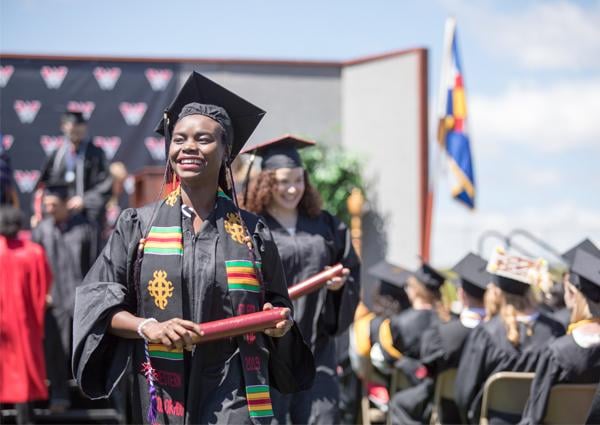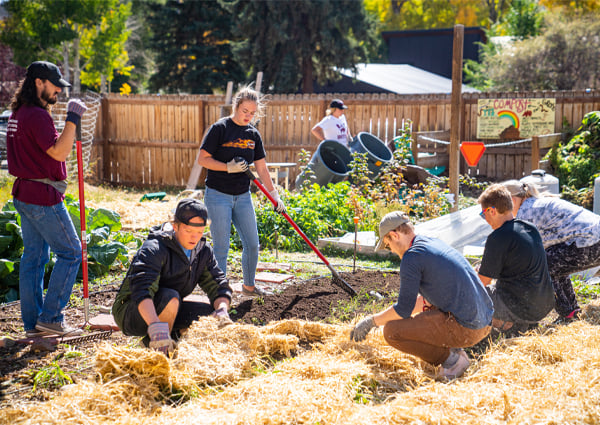Statements from the Board
Western Colorado University (Western) Board of Trustees Statement on Diversity, Equity and Inclusion
Drafted by: BoT, commented and revised by DEI Committee and Student Leaders
On behalf of the President and the Board of Trustees of Western Colorado University (Western), in partnership with Western’s Diversity, Equity and Inclusivity (DEI) Committee and Campus Student Leaders
Western recognizes that systemic, structural, institutional, and interpersonal forms of racism throughout the history of the United States of America have targeted and discriminated against People of Color, and continue to do so.
Western condemns racially motivated violence.
Western affirms that Black lives matter.
Western actively rejects racism and discrimination in all forms; and affirms higher education leadership that prioritizes the elimination of racist and discriminatory practices across campus.
Western recognizes that the current national events and violence targeted towards the Black Community have continued to emphasize the historic inequities and injustices suffered by People of Color in the United States of America.
Western will actively work to condemn racism, improve the reporting transparency of hate crimes on campus, and build a culture that reinforces these stated values by holding student, faculty, and all staff accountable on every institutional level.
Western will annually commit, allocate, and invest funds and resources to ensure DEI-related efforts, evolving practices, and successful outcomes that support the entire campus.
Western, currently a Predominantly White Institution, commits to increasing the representation of nonwhite/minority individuals among faculty, staff, administrators, students, and guest speakers.
Western recognizes that those privileged to work or study at Western bear special responsibilities to be consistently upheld as we move towards our goal of becoming a campus of Inclusive Excellence, as defined by the Association of American Colleges & Universities (AAC&U).
Western affirms the principle of learning and educating, through listening.
Western pledges to actively engage our campus and the Gunnison community in dialogue, training, and programs which will enhance: our individual and collective understanding of how racism targets People of Color, as well as other marginalized communities; our understanding of our role in systems that enable discriminatory practices; and the ways in which we can actively work to correct systemic injustices committed against People of Color.
Contact and background information on Western’s DEI may be found here.
Western’s Faculty Senate authored and adopted a statement on diversity and inclusivity, endorsed by the President and Board of Trustees, that may be found here.
Information pertaining to AAC&U’s Inclusive Excellence may be found here, as well as here.
Section X.X: Campus Free Expression Policy
- Authority This policy is promulgated by the Board of Trustees of Western Colorado University pursuant to C.R.S. § 23-56-102(1).
- Policy Statement The First Amendment to the Constitution of the United States assures that “Congress shall make no law … abridging the freedom of speech, or of the press; or the right of the people peaceably to assemble …” Western acknowledges the rights of its faculty, staff, students, its constituents (together the “Western Community”), and members of the public to engage in free speech and peaceful assembly. The purpose of this policy is to advise the Western Community and members of the public of the procedures and standards of conduct that must be observed by while availing themselves of the use of university campus and facilities in the exercise of those rights. The primary use of Western’s property and facilities is for activities that are directly related to Western’s’ educational mission and purpose, including teaching, research, preparation of scholarly material, student activities, as well as campus support operations. Consistent with the Constitution and applicable law, Western may impose reasonable and content neutral time, place and manner restrictions on the use of its property and facilities, and restrict or limit use that disrupts or interferes with academic mission, business operations, or regular functions of the University. Western also prohibits unlawful activity that endangers the safety of the campus community or injures University property or facilities. This policy both facilitates free expression and exchange of ideas and protects the University.
- Definitions For the purposes of this policy, the following definitions shall apply:
- Free Expression Activities“Free expression activity or activities” means any lawful verbal or written activity by which individuals may communicate ideas to one another, including all forms of peaceful assembly, protests, speaking verbally, holding signs, circulating petitions, and distributing written materials. Expressive Activities include voter registration activities, but do not include activities that are primarily for Solicitation. Nothing within this policy grants any person the right to engage in expressive activity or conduct that is not protected under the First Amendment of the United States Constitution or Article II, Section 10 of the Colorado Constitution.
- Literature“Literature” is defined as any written matter, photos and/or artwork that is not predominantly advertising or commercial in nature.
- Solicitation“Solicitation” is defined as approaching another person to communicate a commercial message, including but not limited to communication through the following means: offering information about services or sales; soliciting an email address, phone number or other contact information for commercial purposes; and distributing any sales flier, coupon book, sample, promotional item, coupon, or similar item. Solicitation of charitable donations is considered commercial speech. Solicitation may be regulated by Western to a greater extent than other free expression activities. Western is under no obligation to make any areas or facilities available for solicitation.
- Unprotected Speech“Unprotected speech” means expressive activities that are not protected by Constitution or law such as communicating in a manner that is defamatory, incites violence or unlawful action, constitutes harassment, is obscene, or consists of fighting words or threats of physical harm.
- Sale“Sale” is defined as any transaction that involves the exchange of money for an item.
- Use of University Grounds, Buildings, and Facilities
- Outdoor Areas on Campus For purposes of engaging in free expression activities, Western will provide its students, faculty, staff, other members of the Western Community, and the public access to all public and open outdoor areas on Western’s campus on a non-discriminatory, content-neutral basis, with the understanding that activities held or reserved by the Western Community shall have priority over the activities of other users. Western will not designate any area as a free speech zone or otherwise limit free expression to a predetermined and designated area of campus. Generally accessible outdoor areas on the campuses shall be available to members of the university community for free expression in accordance with campus policies authorized by this section.
- Use of Indoor Facilities by Western Community In addition, Western will provide its enrolled students access to non-academic and publicly accessible indoor facilities that have traditionally been made available to enrolled students for purposes of free expression activities, subject to the limitations set forth in this section and relevant student and faculty policies.
- Use of Facilities by Members of the Public Except for outdoor area use in conjunction with free expression activities, any member of the public or outside organization seeking to use Western’s restricted outdoor campus spaces, indoor facilities, equipment, office, laboratory, or parking space or lots, must register the activity and obtain the approval of the VP for Student Affairs or his/her designee. Additionally, a member of the public or outside organization will be required to enter into the appropriate Facilities Use Agreement or appropriate facility rental agreement with Western specifying the terms and conditions under which the requested campus resources may be utilized.
- Distribution of Literature Distribution of free literature is permitted outside buildings, provided that such distribution does not disrupt or interfere with normal or previously scheduled activities of a particular place or building, and does not impede ingress and egress to and from campus buildings and pedestrian or vehicular traffic on campus walkways, sidewalks, and streets. Unless otherwise provided in this policy, distribution of free literature that is not part of the teaching, research, or other official functions of the University or not otherwise sponsored by the University or any of its academic or administrative departments, divisions or units is not permitted inside any campus building or any enclosed or special purpose area (such as the stadium), or in any campus residential areas, including University residence halls, campus apartment complexes, and other student housing facilities. The publisher, editor, author or distributor of any literature distributed on campus must be clearly identified on the material distributed. The sale of literature is prohibited without University authorization.
- Time, Place, and Manner Restrictions
- Event Amplification. Amplified sound is generally prohibited on campus, but may be permitted for official University and registered student organization events with the prior approval of the VP for Student Affairs or his/her designee. Amplification must take place during the normal office hours 8:00 am -5:00 pm, unless otherwise authorized. Sound levels are not to exceed 80 decibels at any time. Due to the proximity of classrooms, offices, laboratories, and the library, a Facilities Services staff member will monitor the sound level and may require lower sound levels when necessary to avoid undue disruption of others.
- Campus Postings.Postings by members of the general public are limited to designated bulletin boards in common areas. Students, faculty, and staff may also post to these bulletin boards. Obscenity and libelous material are prohibited. No materials posted on designated bulletin boards may be posted more than two weeks. Posted materials that violate these restrictions are subject to immediate removal.Posting on all other bulletin boards and surfaces on campus is limited to Western academic or administrative departments, divisions, or units, or affiliated organizations or groups. All posted materials must clearly identify the sponsoring organization or group. Obscenity and libelous material will not be approved for campus posting. With the exception of internal postings by Western academic or administrative departments, divisions or units, no materials may be posted on campus more than two weeks, unless the VP for Student Affairs expressly permits an extension of this posting period. Failure to meet these requirements will result in immediate removal of the posted material and may subject the sponsoring organization or group to disciplinary action or prosecution.Chalking is allowed only on the horizontal concrete ground (not on steps, paving stones, buildings or walls) and must be at least 15 feet away from any building entrance. To prevent property damage, only washable chalk may be used; no spray chalk, paint, or similar materials may be used on University property. Violators may be charged for the cost of cleanup and/or prosecuted.
- Campus Solicitation. Any activity that competes with an existing campus business (such as the bookstore) or businesses with which Western has entered into an exclusive contract (such as food service and beverage/snack vending services) and the solicitation, sale or vending of credit cards, alcohol, illegal drugs and drug paraphernalia, cigarettes or other tobacco products, and any item, product, or service prohibited by state or federal law are prohibited.
- Other Restrictions. Any event, demonstration, meeting, assembly, or expressive activity, as well as any persons in attendance, must comply with the applicable rules and policies of the University, including applicable law and University policy regarding restrictions on the consumption and service of alcohol. Any act that unreasonably interferes with the rights of others to peaceably assemble or to exercise the right of free speech, disrupts the normal functioning of the University, damages property, or endangers health or safety is specifically prohibited. No person may attempt to, nor actually interfere with, impair or impede the institution’s regularly scheduled classes, events, ceremonies, or normal and essential operations. The University is required by law to provide and maintain reasonable access to, and exit from, any office, classroom, laboratory, or building. This access must not be obstructed at any time. Vehicular and pedestrian traffic cannot be impeded by demonstrations or gatherings. The provision of medical care cannot be impeded by demonstrations or gatherings. The normal operations of the University (classes, scheduled meetings, events, ceremonies, or other educational purposes) must not be interfered with or disrupted.
- Activity Registration
Activity held on Western’s campus must be registered with the University by filling out and submitting an Event Request Form to the VP for Student Affairs, Facilities Director, Director of Business Operations, and Director of Security seven (7) days in advance of the proposed activity if the activity has any of the following characteristics:- 100 or more people are expected to attend or participate;
- A member of the public seeks access to Western’s indoor facilities for free expression activities;
- A member of the Western Community seeks access to academic or publicly inaccessible indoor facilities that have traditionally not been made available for purposes of free expression activities for such activities;
- Authorized University officials determine that the event is likely to significantly affect campus safety and security, or significantly affect normal University operations, including but not limited to providing usual and customary services to students, faculty and staff, classes and educational activities.
The following information, at minimum, will be required: (1) contact information for the person organizing the activity; (2) nature and type of activity planned; (3) desired date, time, and duration of the activity; (4) estimated number of people expected to participate in the activity; and (5) the type of sound amplification devices, if any, that will be used. This coordination is required so as to prevent disruption of normal University educational activities, coordinate competing requests for the same venue, and avoid endangering the health or safety of persons and damage to property. In exigent circumstances, Western may waive the seven (7) day requirement for advance registration for activities meeting one of the four above characteristics. Such circumstances include where the organizer could not have reasonably anticipated the activity in advance. In such a circumstance, the Event Request Form should be submitted to the VP for Student Affairs, Facilities Director, Director of Business Operations, and Director of Security with the required information and a brief statement regarding the exigent circumstance, and will be reviewed as soon as reasonably practicable.
- Activity Priority Priority to use Western’s campus and facilities for free expression activities will be given as follows:
- Western Community members with an approved Event Request Form.
- Other individuals or groups with an approved Event Request Form.
- Western Students without a registered activity on a first come, first serve basis.
- Other individuals or groups without a registered activity on a first come, first serve basis.
- Objections to Free Expression Activities The University recognizes that individual or groups may be opposed to certain Expressive Activities or speakers. Disagreement with different opinions is acceptable. Sustained or repeated noise made in a manner that substantially interferes with another speaker’s ability to communicate his/her message is not acceptable. Nothing within this policy grants any person the right to materially disrupt previously scheduled or reserved activities or to engage in expressive activity or conduct that is not protected under the First Amendment of the United States Constitution or Article II, Section 10 of the Colorado Constitution.
- Response to Violations of Policy and Disruptive Activities Violations of this policy may result in removal from Western’s campus, police arrest, and criminal charges. In addition, members of the university community are subject to discipline or consequences based under the applicable student or employment disciplinary policies. No disciplinary action may be taken against a student for expressive activities that are otherwise permitted by this policy based upon the content or viewpoint of the student’s expression or the reaction or opposition by listeners or observers to such expression.
- Freedom of Expression by University Faculty
- When engaged in teaching and research, faculty enjoy the associated rights and observe the associated responsibilities of academic freedom. Western can engage in content-based evaluation of faculty who are operating within the professional educational context, as long as this evaluation is based on professional standards or peer assessments of the quality of scholarship or teaching.
- University faculty are members of our Community and members of a learned profession. When university faculty speak or write as citizens, not in furtherance of their university duties or in the course and scope of their university employment, on matters of political, academic, artistic, or social concern, the university shall not censor their expression, initiate disciplinary action against them, or otherwise subject the faculty members to adverse employment actions because it disapproves of the substance of their expression.
- When university faculty speak or write in their personal capacities, not in furtherance of their university duties or in the course and scope of their university employment, they must make every effort to indicate that their expression is their own and does not represent the opinion or position of the university.
- The freedom of expression recognized in this section does not grant university faculty the right to refuse to perform official duties, to materially disrupt the university environment or university activities, or to disregard applicable standards of ethical conduct, including but not limited to those expressed in Western’s Handbook for Professional Personnel and Trustee Policy Manual.
- Freedom of Expression by University Staff
- All staff of the university are members of our Community. When staff of the university speak or write in their personal capacities, not in furtherance of their university duties or in the course and scope of their university employment, on matters of political, academic, artistic, or social concern, the university shall not censor their expression, initiate disciplinary action against them, or otherwise subject the staff members to adverse employment actions because it disapproves of the substance of their expression.
- When staff of the university speak or write as citizens, they must make every effort to indicate that their expression is their own and does not represent the opinion or position of the university.
- The freedom of expression recognized in this section does not grant staff of the university the right to refuse to perform official duties, to materially disrupt the university environment or university activities, or to disregard applicable standards of ethical conduct, including but not limited to those expressed in Western’s Handbook for Professional Personnel and Trustee Policy Manual.
- Freedom of Expression by University Students
- When engaged in educational activities, university students enjoy the associated rights and observe the associated responsibilities of academic freedom.
- University students are members of our Community. When university students speak or write in their personal capacities on matters of political, academic, artistic, or social concern, not in furtherance of their studies or in the course of their academic duties, the university shall not censor their expression, initiate disciplinary action against them, or otherwise subject the students to adverse academic actions because it disapproves of the substance of their expression.
- The freedom of expression recognized in this section does not grant Western students the right to materially disrupt the university environment or university activities or to disregard applicable standards of conduct, including but not limited to those expressed in Western’s approved Student Handbook and Trustee Policy Manual.
Vision Statement
With the Rocky Mountains serving as our laboratory, Western Colorado University is a unique, public institution. As a premier provider of rigorous, immersive education, Western champions intellectual exploration, critical thinking, and integrity, while inspiring innovation. Western offers an inclusive and personalized academic experience that enhances the lives of our students and their communities now and in the future.
Values

Courage
Mountaineers are adventurous and entrepreneurial spirits who embrace change to better ourselves and the people we serve. We boldly act on our convictions.

Growth
Mountaineers believe that rigorous academic inquiry and civil dialogue are necessary for free and open critical thinking that defines our role as a public institution in a democratic society. We foster new ideas by developing both emotional maturity and intellectual curiosity.

Inclusivity
Mountaineers nurture a welcoming community for all faculty, students, staff, and other stakeholders. We are committed to an inclusive, diverse, and equitable campus environment.

Integrity
Mountaineers are committed to acting with the highest ethics, respect for the dignity of others, and personal authenticity. We communicate with openness, honesty and civility, and we are accountable for our actions.

Stewardship
Mountaineers are environmental, intellectual, social, and fiscal stewards of our campus and our global community as places of engagement and personal responsibility.
